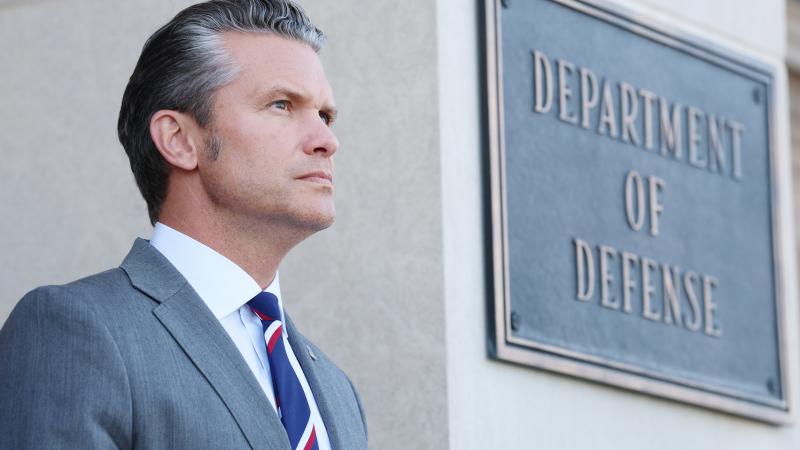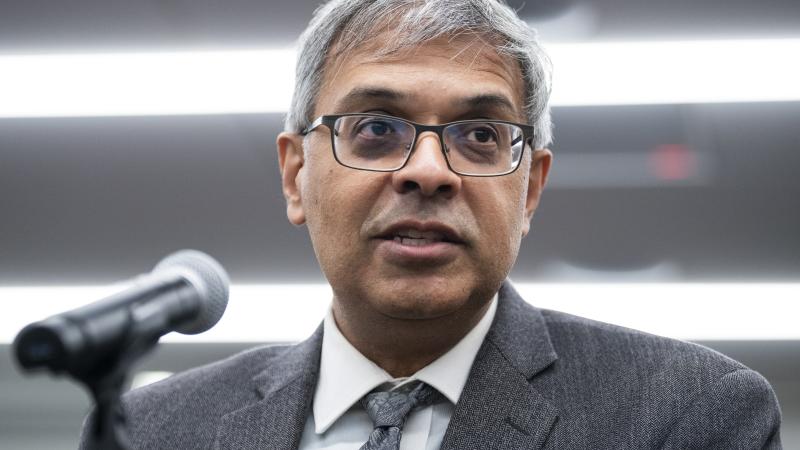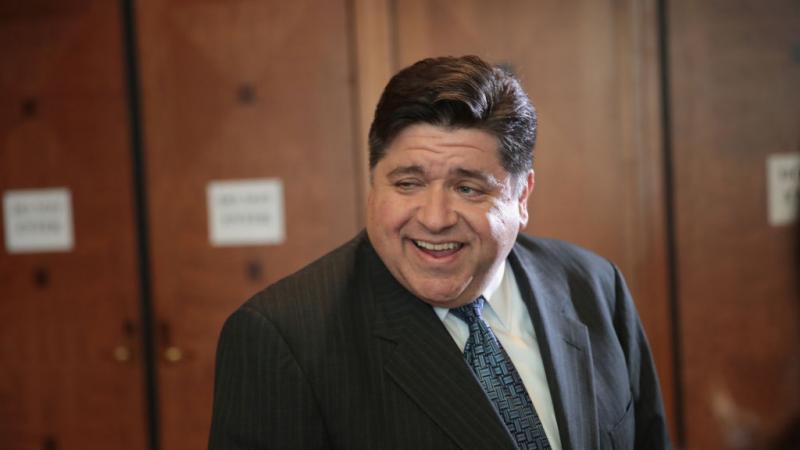Qatar says Biden never asked to expel Hamas leaders after massacre, asked to restore offices
Qatar official also says his nation was grateful when the Trump administration joined other countries in condemning the Israeli airstrike on Qatari soil last week.
A top Qatari official tells Just the News that former President Joe Biden did not ask his country to expel the Hamas leadership after the Oct. 7, 2023 massacre in Israel, and in fact, later the Biden administration asked to restore the terrorist group's offices in Doha, so negotiations could continue.
Dr. Majed Al Ansari, an advisor to Prime Minister Sheikh Mohammed bin Abdulrahman bin Jassim Al Thani, confirmed in a wide-ranging interview on the "Just the News, No Noise" TV show that the Biden administration never sought the extradition of Hamas leadership for U.S. prosecution after the terror attack two years ago.
That attack killed more than 1,200 men, women and children, including 46 Americans and citizens of more than 30 countries, and at the time, the U.S. State Department called it "the largest massacre of Jews since the Holocaust. Girls and women were sexually assaulted. The depravity of Hamas’s crimes is almost unspeakable."
Biden encouraged Qatar to give Hamas a place from which to negotiate
"Since October 7, we were never asked to expel Hamas. Officially, we were never told to stop mediating," Al Ansari said. "At the complete opposite when we decided to suspend our mediation and we asked the Hamas leadership to leave Qatar because there was no purpose for them being there, we were asked by the Biden administration at the time to bring back Hamas to continue the mediation."
This conflicts with claims from senior administration officials last year who told Reuters that the Biden administration had requested Qatar expel the group after multiple failed rounds of ceasefire negotiations.
Al Ansari said his country has been trying to broker peace with Hamas and Israel with the Trump administration's help, a process he said was set back when Israeli forces tried to kill the Hamas leadership with an airstrike on Qatari soil.
"The Trump administration even before coming to the White House, was heavily engaged in the mediation process," he said. "Actually, the last ceasefire was accomplished because of President Trump's resolution, because President Trump decided that there would be a ceasefire. And the proposal that was on the table now was the proposal of President Trump to end this war once and for all.
"So we heavily work with the United States and with the Trump administration over this and we will continue doing these roles on different issues, like the [Democratic Republic of the Congo] and Rwanda, like working over Venezuela, like working over Iran, and all of these issues," he added.
President Donald Trump has made achieving peace deals around the world a centerpiece of his second term foreign policy, but, so far, the largest and most intractable conflicts—the Russia-Ukraine war and Israel’s war with Hamas—have raged on.
Trump started work on the Israel/Hamas conflict before returning to Oval Office
In his second inaugural address, Trump promised a new “golden age” for America, but also that he would work to make his legacy that of a “peacemaker and unifier.”
“That’s what I want to be — a peacemaker and a unifier,” the newly sworn-in president said in his January 20 speech.
Trump and his allies were hard at work to help facilitate one of the first deals between Hamas and Israel even before the president took office earlier this year. In December, the president-elect vowed that there would be “HELL TO PAY” if the Israeli hostages were not released by his inauguration.
Indeed, Hamas and Israel agreed to a hostage and ceasefire deal on the eve of the inauguration that saw the exchange of three hostages for 90 Palestinian prisoners being held in Israel as part of phase one of the deal.
The Trump team and the Biden administration actually worked together to achieve the deal before the inauguration in a rare moment of cooperation. To make good on his campaign promise, the president-elect dispatched Steven Witkoff, the incoming Middle East envoy, to meet with Israeli leader Benjamin Netanyahu, then sit in on the peace negotiations in Doha, Qatar, that produced the final deal.
The Biden administration had struggled to clinch a deal between Hamas and Israel in the months leading up to the meetings. But, after Witkoff arrived, and with Trump’s backing, the talks progressed. The Biden administration publicly credited the Trump team for its “significant support” in achieving the deal after both sides announced an agreement.
Intractability from both sides
However, the ceasefire did not last after Israel tried to negotiate an extension to phase one of that deal. Following this breakdown, several more U.S. proposals for a ceasefire were rejected, this time by Hamas, which felt that its demands were not being met.
At the same time, Israel has escalated its war against the terrorist group and its enclave, seeking to destroy Hamas completely and uproot its political control of the Gaza Strip.
Like Israel, the White House does not want Hamas to remain in control of the strip after a final peace so that the enclave can be rebuilt in a way that addresses Israel’s security concerns. However, Israel and President Trump differ on how to approach that end state. The American president has repeatedly said that he wants to end the conflict as soon as possible.
Israel’s unilateral strike on Hamas leaders in Doha last week particularly upset the White House because it came as Hamas was considering the latest U.S. ceasefire and hostage exchange proposal. The strike interrupted those efforts and angered one of the United States’ key mediating partners, Qatar.
"I'm not thrilled about the whole situation," Trump said following the strikes. "I was very unhappy about it, very unhappy about every aspect, and we got to get the hostages back, but I was very unhappy about the way that went down."
Witkoff on Qataris: “They are good, decent people”
Since the beginning of the conflict, Qatar has assisted the United States in mediating between Hamas leadership and Israel. Because the terrorist group’s political leaders are allowed to reside in the Arabian Gulf state, Qatari officials have close and valuable access.
President Trump’s key negotiator, Witkoff, has a close working relationship with the Qataris and has repeatedly praised their efforts. “They are good, decent people,” Witkoff said in March. “What they want is an effective mediation that gets to a peace goal. Why? Because they are a small nation, and they want to be acknowledged as a peacemaker.”
As a sign of the close working relationship the Trump administration has developed with Qatar, the White House attempted to warn the gulf monarchy of the imminent strike. Last week, the White House confirmed that the president directed Witkoff to warn the Qatari government of an Israeli attack on its territory ahead of time. However, the Qataris say the warning came too late, in the midst of the attack.
But, Israel’s strike on the Hamas leadership is not the only thing that could hold peace talks back. The Trump team has also faced difficulty in pressuring Hamas to agree to compromise on any of its core demands to achieve a ceasefire. In July, President Trump recalled Witkoff and the negotiating team from Doha citing the terrorist group’s “lack of desire to reach a ceasefire” and accused the group of not “acting in good faith.”
For Qatar’s leaders though, the Israeli strike at Hamas on its own soil endangers any negotiated solution to the Gaza conflict and is also an affront to the Arab state’s sovereignty. Al Ansari told Just the News his country was grateful when the Trump administration joined other countries in condemning the Israeli airstrike on Qatari soil last week.
"We are overwhelmed by the solidarity, the support, and the generosity of the United States in standing with Qatar in this difficult time," he said.
Netanyahu and Rubio slated to meet
Qatar hosted a summit of Arab and Islamic states in Doha on Monday to respond to the Israeli strikes. Qatar’s Emir Al Thani warned fellow Arab states of Israel’s vision for the region and called the assault on his country “blatant, treacherous, and cowardly.” He also called the strike a “terrorist act.”
Israeli Prime Minister Benjamin Netanyahu shows no signs of backing down. After appearing to admit that the strike failed to eliminate Hamas’ political leadership in Doha, he promised in a meeting with U.S. Secretary of State Marco Rubio that Israel would continue to target the group’s leaders “wherever they are.”
Secretary Rubio, who is traveling in the region, is set to arrive in Qatar on Tuesday as tensions between the two American allies still remain high.
The Facts Inside Our Reporter's Notebook
Links
- a wide-ranging interview
- U.S. State Department called it
- requested Qatar expel the group
- said in his January 20 speech
- the president-elect vowed
- actually worked together
- publicly credited the Trump team
- Trump said following the strikes
- repeatedly praised
- citing the terrorist groupâs
- warned fellow Arab states
- failed to eliminate Hamasâ political leadership
- continue to target the groupâs leaders












